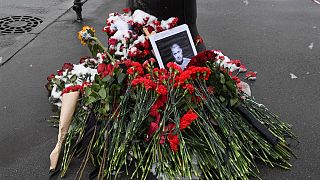Moscow blames Ukraine for bomb that killed pro-Russian blogger
Russian authorities blamed Ukrainian intelligence agencies on Monday for allegedly orchestrating the killing of a prominent pro-Kremlin military blogger in a St. Petersburg café bomb blast.

A portrait of Russian military blogger Vladlen Tatarsky is seen among flowers at a makeshift memorial
by the explosion site in Saint Petersburg on April 3, 2023. – Copyright OLGA MALTSEVA/AFP or licensors
Vladlen Tatarsky died while speaking at a public event at the café on Sunday. At least 30 people were injured.
Tatarsky, who had filed regular reports from the front lines in Ukraine, was the pen name for Maxim Fomin. He had accumulated more than 560,000 followers on his Telegram messaging app channel.
Ukrainian authorities did not directly respond to the accusation, but President Volodymyr Zelenskyy said that he doesn’t think about events in Russia and a senior official earlier described the bombing as part of Russia’s internal turmoil.
Victim presented with a bust
Interfax said that a St. Petersburg woman, Darya Tryopova, was arrested on suspicion of involvement in the bombing. It said that she had been previously detained for taking part in anti-war rallies.
Russian media and military bloggers said Tatarsky was meeting with members of the public when a woman presented him with a box containing a bust of him that apparently blew up. A patriotic Russian group that organised the event said it had taken security precautions but acknowledged that those measures “proved insufficient.”
In remarks recorded on video, a witness said that a woman who identified herself as Nastya asked questions and exchanged remarks with Tatarsky during the discussion.
The witness, Alisa Smotrova, quoted Nastya as saying she had made a bust of the blogger but that guards asked her to leave it at the door, suspecting it could be a bomb.
Nastya and Tatarsky joked and laughed. She then went to the door, grabbed the bust and presented it to Tatarsky.
He reportedly put the bust on a nearby table, and the explosion followed. Smotrova described people running in panic, some hurt by shattered glass and covered in blood.
Russian media said investigators were looking at the bust as the possible source of the blast but have not ruled out the possibility that an explosive device was planted in the cafe before the event.
Ukraine denies involvement
The Russian Interior Ministry released a brief video showing Trepova telling a police officer that she brought the statuette that exploded to the cafe. When asked who gave it to her, she said she would explain it later.
According to Russian media reports, Trepova told investigators that she was asked to deliver the bust, but didn’t know that it was hidden in it.
The National Anti-Terrorist Committee, which coordinates counterterrorism operations, said that the bombing was “planned by Ukrainian special services” and noted that Trepova was an “active supporter” of jailed Russian opposition leader Alexei Navalny.
Navalny, the Kremlin’s fiercest foe who had exposed official corruption and organized massive antigovernment protests, is serving a nine-year fraud sentence that he has denounced as a political vendetta.
Police reportedly tracked Trepova down using surveillance cameras, though she had allegedly cut her long blonde hair short to change her look and rented a different apartment in an apparent attempt to escape.
Yevgeny Prigozhin, the Russian millionaire owner of the Wagner mercenary Group spearheading Moscow’s offensive in eastern Ukraine, said he owned the cafe and had allowed patriotic groups to use it for meetings. He said he doubts the Ukrainian authorities’ involvement in the bombing, saying the attack was likely launched by a “group of radicals” unrelated to the government in Kyiv.
Zelenskyy brushed off questions about the bombing on Monday.
“I don’t think about what is happening in St. Petersburg or Moscow. Russia should think about this. I am thinking about our country,” Zelenskyy told journalists.
While not claiming responsibility for various explosions, bombings, and other attacks within Russia since the February 24, 2022, invasion, Ukrainian authorities have often greeted them jubilantly.
Ukrainian presidential adviser Mykhailo Podolyak responded to the news about the bombing attack in St. Petersburg by casting it as a result of infighting in Russia.
“Spiders are eating each other in a jar,” he wrote in English on Twitter late Sunday. “Question of when domestic terrorism would become an instrument of the internal political fight was a matter of time.”
Tatarsky known for pro-war rhetoric
Born in the Donbas, Ukraine’s industrial heartland, Tatarsky worked as a coal miner before starting a furniture business. When he ran into financial difficulties, he robbed a bank and was sentenced to prison. He fled from custody after a Russia-backed separatist rebellion engulfed the Donbas in 2014, weeks after Moscow’s annexation of Ukraine’s Crimean Peninsula. Then he joined separatist rebels and fought on the front line before turning to blogging.
Tatarsky was known for his blustery pronouncements and ardent pro-war rhetoric.
After the Kremlin’s annexation of four regions of Ukraine last year that most of the world rejected as illegal, Tatarsky posted a video in which he vowed: “That’s it. We’ll defeat everybody, kill everybody, rob everybody we need to. It will all be the way we like it. God be with you.”
Military bloggers have played an increasingly prominent and influential role in the flow of information about Russia’s invasion of Ukraine. They have almost universally championed the goals of the campaign but at times criticise Russian military strategy and tactical decisions.
At the same time, the Kremlin has squelched alternative voices opposing the war by shutting down news outlets, limiting the public’s access to information and jailing critics.
Source:euronews.com/2023/04/03
